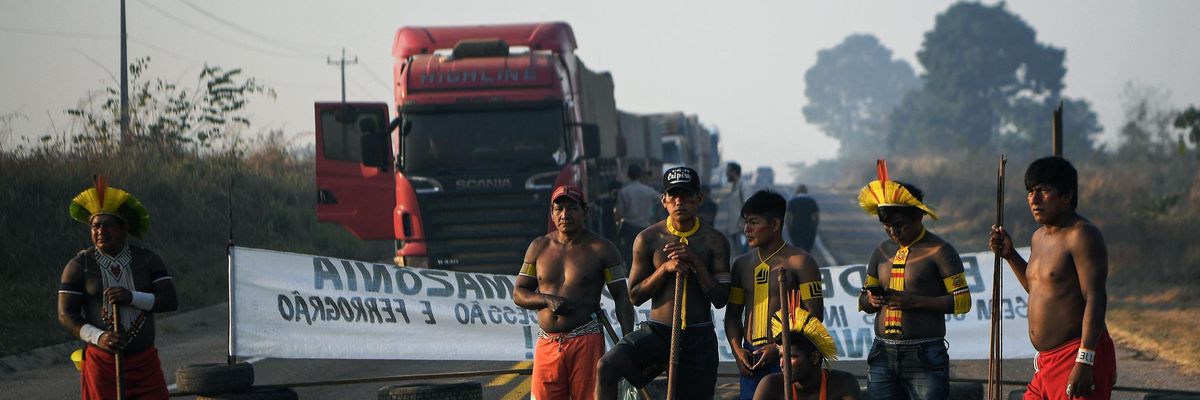A record 227 environmental defenders were murdered last year--with over half of these killings perpetrated in Colombia, Mexico, and the Philippines--according to a report published Monday by Global Witness.
"As the climate crisis intensifies, violence against those protecting their land and our planet also increases."
--Global Witness
The international human rights group, which has been tracking and reporting lethal attacks on environmental activists since 2012, said it recorded an average of more than four such killings per week in 2020, "making it once again the most dangerous year on record for people defending their homes, land and livelihoods, and ecosystems vital for biodiversity and the climate."
"A grim picture has come into focus--with the evidence suggesting that as the climate crisis intensifies, violence against those protecting their land and our planet also increases," Global Witness said in an introduction to the report (pdf). "It has become clear that the unaccountable exploitation and greed driving the climate crisis is also driving violence against land and environmental defenders."
The 227 lethal attacks represent a 7% increase over the 212 deaths recorded by Global Witness in last year's report. As in 2019, Colombia witnessed the highest number of slain land defenders, with 65 murders reported, followed by Mexico with 30 killings--a 67% increase from 2019--and the Philippines, where 29 activists were murdered.
Brazil, with 20 slain land defenders, and Honduras, which saw 17 such killings, rounded out the top five deadliest countries for environmental activists. On a per capita basis, Nicaragua, Honduras, Colombia, Guatemala, and the Philippines were the five deadliest nations for land defenders last year.
According to the report, "over a third of the attacks were reportedly linked to resource exploitation--logging, mining, and large-scale agribusiness--and hydroelectric dams and other infrastructure," although "this figure is likely to be higher as the reasons behind these attacks are often not properly investigated nor reported on."
Once again, native land defenders were disproportionately targeted, "with over a third of all fatal attacks targeting Indigenous people, despite only making up 5% of the world's population."
"Indigenous peoples were the target of five of the seven mass killings recorded in 2020," the publication added. "In the most shocking of these, nine Tumandok Indigenous people were killed and a further 17 arrested in raids by the military and police on the 30th of December on the island of Panay in the Philippines. Numerous reports state that these communities were targeted for their opposition to a mega-dam project on the Jalaur river."
Additionally, "28 of the victims killed in 2020 were state officials or park rangers, attacked whilst working to protect the environment." Such attacks were documented in eight countries: Brazil, Colombia, the Democratic Republic of Congo, Guatemala, the Philippines, Sri Lanka, Thailand, and Uganda.
Global Witness partially blames rapacious corporations, which are "operating with almost complete impunity," for lethal attacks on land defenders.
"Because the balance of power is stacked in the favor of corporations, and against communities and individuals, these companies are seldom held to account for the consequences of their commercial activities," the report states. "It's rare that anyone is arrested or brought to court for killing defenders. When they are it's usually the trigger-men--the ones holding the guns, not those who might be otherwise implicated, directly or indirectly, in the crime."
The report recommends that governments pass laws to "hold corporations accountable for their actions and profits." It also urges the United Nations, through its member states, to "formally recognize the human right to a safe, healthy, and sustainable environment."
Additionally, countries should "protect land and environmental defenders in the context of business by ensuring effective and robust regulatory protection of the environment, labor rights, land rights, Indigenous peoples' rights, livelihoods, and cultures," while "any legislation used to criminalize defenders should be declared null and void."
The report also calls on businesses "to ensure they are not contributing to or profiting from human rights and land rights harms across their supply chains and operations."
Global Witness senior campaigner Chris Madden said in a statement that governments must "get serious about protecting defenders," and that companies must start "putting people and planet before profit."
Madden called the new report "another stark reminder that fighting the climate crisis carries an unbearably heavy burden for some, who risk their lives to save the forests, rivers, and biospheres that are essential to counteract unsustainable global warming."
Meanwhile, land defenders fight on--and instead of deterring activism, the attacks often motivate even greater action.
"People sometimes ask me what I'm going to do, whether I'm going to stay here and keep my mother's fight alive," said Malungelo Xhakaza, the daughter of South African activist Fikile Ntshangase, who was shot dead in her home in front of her family last October after helping lead the campaign against the Tendele Coal Mine.
"I'm too proud of her to let it die," Xhakaza added. "I know the dangers--we all know the dangers. But I've decided to stay. I'm going to join the fight."
